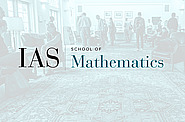Seminars Sorted by Series
Computer Science/Discrete Mathematics Seminar I
Feb
26
2018
Computer Science/Discrete Mathematics Seminar I
A Tight Bound for Hypergraph Regularity
11:00am|Simonyi Hall 101
Mar
05
2018
Computer Science/Discrete Mathematics Seminar I
Boolean function analysis: beyond the Boolean cube
11:00am|West Building Lecture Hall
Mar
19
2018
Computer Science/Discrete Mathematics Seminar I
Operator Scaling via Geodesically Convex Optimization, Invariant Theory and Polynomial Identity Testing
Yuanzhi Li
11:00am|Simonyi Hall 101
Mar
26
2018
Computer Science/Discrete Mathematics Seminar I
Circuit Lower Bounds for Nondeterministic Quasi-Polytime: An Easy Witness Lemma for NP and NQP
Cody Murray
11:00am|Simonyi Hall 101
Apr
09
2018
Computer Science/Discrete Mathematics Seminar I
Large deviations in random graphs
Eyal Lubetzky
11:00am|West Building Lecture Hall
Apr
16
2018
Computer Science/Discrete Mathematics Seminar I
Sums of Squares Over k-Subset Hypercubes
Annie Raymond
11:00am|Simonyi Hall 101
Sep
24
2018
Computer Science/Discrete Mathematics Seminar I
Four and a half proofs of a product-measure version of the Erdös-Ko-Rado Theorem.
2:00pm|Simonyi Hall 101
Oct
01
2018
Computer Science/Discrete Mathematics Seminar I
Oracle Separation of Quantum Polynomial time and the Polynomial Hierarchy
11:15am|Simonyi Hall 101
Oct
15
2018
Computer Science/Discrete Mathematics Seminar I
Breaking the Circuit-Size Barrier in Secret Sharing
Vinod Vaikuntanathan
11:15am|Simonyi Hall 101
Oct
22
2018
Computer Science/Discrete Mathematics Seminar I
Approximating the edit distance to within a constant factor in truly subquadratic time.
Mike Saks
11:15am|Simonyi Hall 101
Oct
29
2018
Computer Science/Discrete Mathematics Seminar I
2-universality of random graphs.
Gal Kronenberg
11:15am|Simonyi Hall 101
Oct
29
2018
Computer Science/Discrete Mathematics Seminar I
X-Ramanujan graphs: ex uno plures
Ryan O\'Donnell
3:30pm|Simonyi Hall 101
Nov
05
2018
Computer Science/Discrete Mathematics Seminar I
Sunflowers and friends
11:15am|West Building Lecture Hall
Nov
12
2018
Computer Science/Discrete Mathematics Seminar I
No Seminar (Oberwolfach)
No Seminar (Oberwolfach)
11:15am|Simonyi Hall 101
Nov
26
2018
Computer Science/Discrete Mathematics Seminar I
Classical Verification of Quantum Computations
Urmila Mahadev
11:15am|Simonyi Hall 101
Nov
26
2018
Computer Science/Discrete Mathematics Seminar I
Classical Verification of Quantum Computations
Urmila Mahadev
11:15am|Simonyi Hall 101
Dec
03
2018
Computer Science/Discrete Mathematics Seminar I
No Seminar (Simons workshop Berkeley)
11:15am|No Seminar (Simons workshop Berkeley)
Dec
10
2018
Computer Science/Discrete Mathematics Seminar I
A matrix expander Chernoff bound
Ankit Garg
11:15am|Simonyi Hall 101
Jan
21
2019
Computer Science/Discrete Mathematics Seminar I
11:00am|no seminar - Dr. Martin Luther King Day
Jan
28
2019
Computer Science/Discrete Mathematics Seminar I
PCP and Delegating Computation: A Love Story.
Yael Tauman Kalai
11:00am|Simonyi Hall 101
Feb
04
2019
Computer Science/Discrete Mathematics Seminar I
Near-Optimal Strong Dispersers
Dean Doron
11:00am|Simonyi Hall 101
Feb
11
2019
Computer Science/Discrete Mathematics Seminar I
Interactive Coding Over the Noisy Broadcast Channel
11:00am|Simonyi Hall 101
Feb
25
2019
Computer Science/Discrete Mathematics Seminar I
Strongly log concave polynomials, high dimensional simplicial complexes, and an FPRAS for counting Bases of Matroids
Shayan Oveis Gharan
11:00am|Simonyi Hall 101
Mar
04
2019
Computer Science/Discrete Mathematics Seminar I
Local and global expansion of graphs
Yuval Peled
11:00am|West Building Lecture Hall
Mar
11
2019
Computer Science/Discrete Mathematics Seminar I
Near log-convexity of measured heat in (discrete) time and consequences
Mert Sağlam
11:00am|Simonyi Hall 101
Mar
18
2019
Computer Science/Discrete Mathematics Seminar I
An Application of the Universality Theorem for Tverberg Partitions
Imre Barany
11:00am|Simonyi Hall 101
Mar
25
2019
Computer Science/Discrete Mathematics Seminar I
On the Approximation Resistance of Balanced Linear Threshold Functions
11:00am|Simonyi Hall 101
Apr
01
2019
Computer Science/Discrete Mathematics Seminar I
Fooling polytopes
Li-Yang Tan
11:00am|Simonyi Hall 101
Apr
08
2019
Computer Science/Discrete Mathematics Seminar I
Collective Coin-Flipping Protocols and Influences of Coalitions
11:00am|Simonyi Hall 101
Apr
15
2019
Computer Science/Discrete Mathematics Seminar I
On the possibility of an instance-based complexity theory.
11:00am|Simonyi Hall 101
Oct
07
2019
Computer Science/Discrete Mathematics Seminar I
An improved sunflower bound.
Jiapeng Zhang
11:00am|Simonyi Hall 101
Oct
08
2019
Computer Science/Discrete Mathematics Seminar I
Asymptotic spectra and Applications I
10:30am|Simonyi Hall 101
Oct
14
2019
Computer Science/Discrete Mathematics Seminar I
Choiceless Polynomial Time
Ben Rossman
11:00am|Simonyi Hall 101
Oct
15
2019
Computer Science/Discrete Mathematics Seminar I
Asymptotic spectra and Applications II
10:30am|Simonyi Hall 101
Oct
21
2019
Computer Science/Discrete Mathematics Seminar I
Learning arithmetic circuits in the average case via lower bounds
Ankit Garg
11:00am|Simonyi Hall 101
Oct
22
2019
Computer Science/Discrete Mathematics Seminar I
Towards a theory of non-commutative optimization: geodesic 1st and 2nd order methods for moment maps and polytopes
Rafael Oliveira
10:30am|Simonyi Hall 101
Oct
28
2019
Computer Science/Discrete Mathematics Seminar I
Furstenberg sets in finite fields
11:00am|Simonyi Hall 101
Oct
29
2019
Computer Science/Discrete Mathematics Seminar I
Extremal set theory
Andrey Kupavskii
10:30am|Simonyi Hall 101
Nov
04
2019
Nov
18
2019
Computer Science/Discrete Mathematics Seminar I
An isoperimetric inequality for the Hamming cube and some consequences
Jinyoung Park and Jinyoung Park
11:00am|Simonyi Hall 101
Nov
25
2019
Computer Science/Discrete Mathematics Seminar I
Lifting small locally testable codes (LTCs) to large LTCs via HDXs
Prahladh Harsha
11:00am|Simonyi Hall 101
Dec
02
2019
Computer Science/Discrete Mathematics Seminar I
Rainbow fractional matchings
Ron Holzman
11:00am|Simonyi Hall 101
Dec
09
2019
Computer Science/Discrete Mathematics Seminar I
Graph Sparsification via Short Cycle Decomposition
11:00am|Simonyi Hall 101
Dec
16
2019
Computer Science/Discrete Mathematics Seminar I
Thresholds Versus Fractional Expectation-Thresholds
Keith Frankston
11:00am|Simonyi Hall 101
